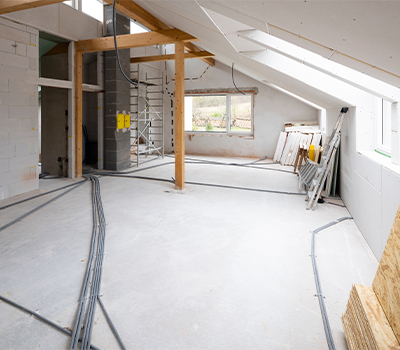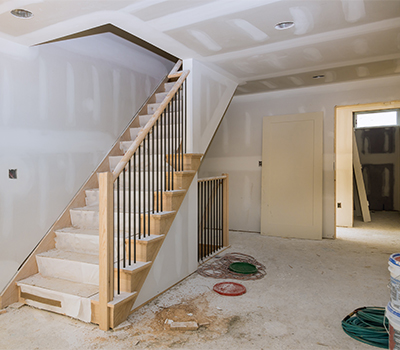Should I Extend My Home?
1 April 2025
“The perennial question do I move house to gain more space, or should I extend my home?” can be an exciting prospect for some homeowners but equally it can prove to be an expensive and less than satisfying conundrum to deal with.
Having some building work done is notoriously stressful and disruptive for your home and your daily routine. Often large sums are involved, and lots can go wrong. Homeowners face an estimated £1.7 billion in costs every year due to botched home improvement work. There are over 110,000 complaints about building work notified to the Department of Trade & Industry each year. That doesn’t take into account the ones resolved in other ways.
So How Do We Find a Good and Reliable Builder?
The best way is by recommendation. Ask if the builder:
- Started and finished on time
- Kept the site tidy
- Cleared up at the end
- Struck to the agreed price and
- Overall did a good job of work.
Remember, however, some problems take years to become evident. By then the builder may have ‘vanished’. I remember a small builder working in an affluent part of Southwest London some years ago. He carried out several well-executed projects, had a large order book for which deposits were paid, and then swiftly left the country!
You can find builders in your area who are registered with the Federation of Master Builders on their website. However, while standards for joining the Federation are high, it does not inspect the work of members. Beware, some unscrupulous cowboy builders put the Federation’s logo on their letterhead even though they are not members. Request to see their certificate of membership.
You can also look for a builder under the Quality Mark scheme (0845 300 8040), a government-backed register with details of more than 500 firms. Finally, you might try Which Local, which the Consumers Association set up to allow satisfied customers to recommend companies that have done good work for them.
Getting a Price
The Old Adage “Don’t rush in” is most apt when finding someone. It’s always tempting to excitedly rush into a project. But at the least obtain three quotations. The Building Cost Information Service will give you an idea of how much a job should cost. Don’t necessarily go for the cheapest quote; take into account the answers to your questions.
Planning Permission Needed or Permitted Development?
Find out if you need planning permission or if building regulations apply to your job. If it qualifies as “building work”, which includes everything from building an extension to installing a new window or boiler, you are obliged to have it inspected and certified by your local council (which will require a fee).
Planning permission covers larger projects and for this you need to apply to your local council planning department, providing plans. The department responsible at your local council will either use their in-house Building Control, or they will direct you to an independent practitioner. They will tell you all you need to know. You will need the certificates when you come to sell your house as the Purchaser’s solicitor will want to see them as part of the conveyancing process.



All of this may seem daunting and a minefield to negotiate. It can on more complex projects be more prudent to hire an architect or Chartered surveyor to help you plan the job and then oversee it. Typically, they charge fees of 10-13% of the value of the work, but they can save you money by ensuring you have chosen the right builder and that costs are checked and quantified. By thinking of the end product, you can make sure that you can get good quality work.
Regardless of the self-imagining of a project or the use of a professional to manage the project, here are the key questions to ask:
Could You Give Me the Names of Some People For Whom You Have Done Work So I Can Contact Them?
Make sure you speak to them in case the builder has invented them.
Ask to see the work and forget about anyone who won’t show you the work they have done.
Ask to see some older work as well as a recent job. There will have been more time for faults to become apparent.
Have You Done a Job Like Mine?
It’s better if the builder has done something at least reasonably similar. He could be learning how to do it at your expense.
How Long Have You Been In Business?
A builder can demonstrate this by producing records or other paperwork like bank statements or contracts.
Do You Operate From a Fixed Address?
It’s a bad sign if they don’t. While an individual tradesman can operate from home, a builder needs space to store equipment and supplies. A home address is all right as an office address, but a builder needs premises somewhere.
Can You Provide Trade References?
References from a supplier about a builder’s credit facilities and payment are a good indication of financial stability and management.
Check how long he has been with his current bank. Beware of someone who keeps changing his bank as this can indicate financial problems.
Are You Registered For VAT?
Generally, look for a builder who is VAT registered. The VAT threshold is currently £64,000 and someone with a turnover below that cannot be doing very much work.
If someone offers to waive VAT if you pay cash, beware. Tax avoidance is not the sign of the honest type you want. It puts you in a weak position in the event of a dispute.
Do You Give a Written Estimate and Quotation?
It’s essential. Never accept a verbal assurance that it will cost ‘about £10,000’. It’s important to distinguish between an estimate and a quotation.
An estimate is only an estimate, it has no binding force. A quotation is an undertaking to do the job for a stated price.
You can move from an estimate to a quotation once you have established exactly what is to be done. You may want to change a few things to save money after seeing the estimate.
The final detailed quotation should include:
- All the work to be done
- Date of completion
- Security and safety
- Catering and toilet arrangements
- Disposal of rubbish
- Water and power supplies
- Hours of working and so on. But better still, ask for a written contract.
You can download a standard one from the Federation of Master Builders website (www.fmb.org.uk). Once the builder signs it, you will be much better covered.
When Can You Start?
Cross-examine your prospective builders on how realistic proposed start dates really are. Don’t push for an early start if this is unrealistic. On larger projects, ask for a timetable so you can see if the job is slipping behind.
How Many Jobs Do You Have on at The Moment?
You will need to relate this to the size of his workforce. A small workforce and a lot of projects could mean he is overstretched. If this means excessive use of casual labour or sub-contractors, it could spell trouble.
Do You Have Insurance Cover?
Your builder is legally obliged to have both public and employers’ liability insurance. Make sure you see the relevant certificates of insurance. They should have at least £2 million cover. They should also have other insurance to cover other problems which may arise. Again, ask to see their certificate.
Do You Offer a Guarantee of Your Work?
It’s much better if he does, although it can be valueless in practice if he goes out of business. The far better solution to ensure you are protected is to contact your insurance broker, such as Anthony Wakefield & Company, and purchase a 10-year warranty to cover building work. While you will have to bear the cost of insurance yourself, you will know that you are covered.
Have You Had Any Claims Against You Under Health & Safety Legislation?
Work on a building site is regulated by Health & Safety Legislation. This covers things like:
- Project and risk management
- Maintenance of equipment
- Standards of work
- Safety procedures and the like.
You are yourself liable for certain facets of a job until you can show that you have definitely devolved responsibility from your builder. Ask him how he complies with the legislation – as well as any claims against him.
As a supplementary question, ask if the Construction (Design and Management) Regulations 2015 or CDM for short applies. A project is notifiable for CDM when the construction is scheduled to last longer than 30 working days, and it will have more than 20 workers working at the same time at any point in the building project.



Do You Expect a Deposit?
If he does, forget about him. The builder should be in sufficiently good financial shape to purchase supplies without needing your cash up-front to do it. The only exception would be where some rare kind of very expensive initial purchase has to be made, for instance bespoke glass works.
How and When Do We Pay?
If the job is big enough – for example, if it lasts four weeks or more – then agree on stage payments and define them precisely.
Agree what percentage of the total bill you will retain until you can be sure that all the work is satisfactory. This should be 10-20%. If you pay in cash, you will be in a very weak position in the event of any dispute. It is better to pay by bank transfer, cheque or credit card. If you can use the latter, then the card provider will be jointly liable for payment. This may help you in the event of a dispute. Check that your builder will accept payment by credit card. Many do not – understandably, because of the fees charged by the card.
Using a professional to administer the project will mean that works are valued, and the amount of each stage payment is quantified.
How Do You Deal With Changes to the Specification?
Any changes should be put in writing. If there is a knock-on effect on the costs and finish date, these should be put in writing too as an addition to the quotation or contract. Please do not venture onto a project thinking you can easily change your mind as you go along. Most changes of mind will cost you money and cause delay.
Variations on a project are the prime cause for going over budget, so when planning a project have you allowed a contingency? Some cost increase may be unavoidable, such as deep foundations being required and cost of materials escalating. In the aftermath of the Grenfell Tower fire the price for insulation materials went skyward, given the shortage of certified products available.
How to Measure the Progress of the Project
Easy if you are living in the building being altered or extended.
Stipulate that you want to turn up regularly to inspect work and come whenever any particularly important element of the work is underway. Drop in unexpectedly from time to time – is the builder happy with that?
At certain times, given the nature of the work, such as lifting heavy steel joists into place or when deep foundations are being dug, Health and Safety issues may need to be observed. However, generally, this shouldn’t be an issue.
Ask when particular tasks are to be done which involve things like pipes, wiring or damp-proof membranes being covered up. Make sure all is well before they disappear. Dropping in unannounced from time to time may not catch anyone out, but the knowledge that you might should at least be a deterrent to a bit of cheating. If a builder seems negative about this, don’t employ him. You want someone who takes pride in his work and will also be pleased to have the opportunity to sort out minor alterations or challenges that crop up.
Specialists’ Advice and How to Get the Help You Need
If you require help from a specialist, like a structural engineer, to design roofs, calculate the size of lintels required for openings, and remove walls to form, for instance, open plan accommodation. Or if you need a drainage consultant, a central heating engineer or Independent Building Control, you must ask your builder:
- If he has access to someone
- How he proposes to use them and
- Exactly where responsibility lies for their contribution.
This neatly brings us to what you may consider one of the most important questions when planning your project.
What Are Your Trade Skills?
Always ask your prospective Builder if they have trades and skills in-house with an experienced and established team. Do they hire casual labour and sub-contractors?
It is much better if your builder has an established team. He may find it difficult to impose his own standards on people he has never seen before, like migrant tradesmen. If he is starting off someone new, he should supervise him long enough to confirm his competence before leaving the site. Additionally, if a builder needs to hire sub-contractors – e.g. for plumbing, electrical, central heating, these should be tradespeople whose work he knows well.
Do I Need Insurance Cover?
Make sure you have your own Public Liability insurance in case something affects neighbours or passers-by. In the first instance, call your broker and ensure that your insurance company knows about the proposed building work. Having builders in may affect the terms of your Buildings and Contents policy.
What To Do If Something Goes Wrong?
Speak to your builder as soon as you spot something you don’t like the look of. The longer you leave it, the more difficult it will become to sort things out.
If you can’t resolve matters, you can seek help from the Federation of Master Builders or the Quality Mark scheme which runs arbitration services. Otherwise, you will need to engage a Chartered Surveyor. This will send costs shooting up. If you don’t promptly resolve matters, it could leave you living in a building site for months.
Working with Arbiter Adjusters, Anthony Wakefield & Company Ltd can discuss your options on insuring your property and give you appropriate advice. Please contact Cyrus Wakefield on 01306 734 102 for further information or email him at: cw@anthonywakefield.com
